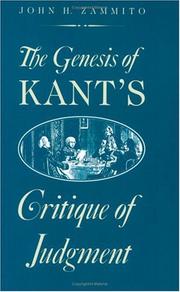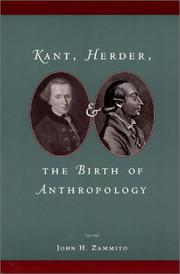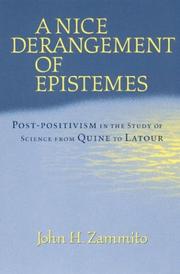| Listing 1 - 9 of 9 |
Sort by
|

ISBN: 0226978540 0226978559 9780226978550 9780226978543 Year: 1992 Publisher: Chicago, Ill. University of Chicago Press
Abstract | Keywords | Export | Availability | Bookmark
 Loading...
Loading...Choose an application
- Reference Manager
- EndNote
- RefWorks (Direct export to RefWorks)
In this philosophically sophisticated and historically significant work, John H. Zammito reconstructs Kant's composition of The Critique of Judgment and reveals that it underwent three major transformations before publication. He shows that Kant not only made his "cognitive" turn, expanding the project from a "Critique of Taste" to a Critique of Judgment but he also made an "ethical" turn. This "ethical" turn was provoked by controversies in German philosophical and religious culture, in particular the writings of Johann Herder and the Sturm und Drang movement in art and science, as well as the related pantheism controversy. Such topicality made the Third Critique pivotal in creating a "Kantian" movement in the 1790s, leading directly to German Idealism and Romanticism. The austerity and grandeur of Kant's philosophical writings sometimes make it hard to recognize them as the products of a historical individual situated in the particular constellation of his time and society. Here Kant emerges as a concrete historical figure struggling to preserve the achievements of cosmopolitan Aufkl-rung against challenges in natural science, religion, and politics in the late 1780s. More specifically Zammito suggests that Kant's Third Critique was animated throughout by a fierce personal rivalry with Herder and by a strong commitment to traditional Christian ideas of God and human moral freedom.
Aesthetics --- Kant, Immanuel --- Judgment (Aesthetics) --- Beautiful, The --- Beauty --- Esthetics --- Taste (Aesthetics) --- Philosophy --- Art --- Criticism --- Literature --- Proportion --- Symmetry --- Psychology --- -Aesthetics --- Kant, Immanuel, --- Kant, Emmanuel --- Kant, Emanuel --- Kant, Emanuele --- Aesthetics. --- Knowledge, Theory of --- Judgment (Aesthetics). --- Kant, I. --- Kānt, ʻAmmānūʼīl, --- Kant, Immanouel, --- Kant, Immanuil, --- Kʻantʻŭ, --- Kant, --- Kant, Emmanuel, --- Ḳanṭ, ʻImanuʼel, --- Kant, E., --- Kant, Emanuel, --- Cantơ, I., --- Kant, Emanuele, --- Kant, Im. --- קאנט --- קאנט, א. --- קאנט, עמנואל --- קאנט, עמנואל, --- קאנט, ע. --- קנט --- קנט, עמנואל --- קנט, עמנואל, --- كانت ، ايمانوئل --- كنت، إمانويل، --- カントイマニユエル, --- Kangde, --- 康德, --- Kanṭ, Īmānwīl, --- كانط، إيمانويل --- Kant, Manuel, --- Radio broadcasting Aesthetics --- Kant, Immanuel, - 1724-1804 - Kritik der Urteilskraft --- Kant, Immanuel, - 1724-1804 - Aesthetics --- Kant, Immanuel, - 1724-1804
Book
ISBN: 9780226520797 9780226520827 022652082X 022652079X Year: 2018 Publisher: Chicago, Ill. The University of Chicago Press
Abstract | Keywords | Export | Availability | Bookmark
 Loading...
Loading...Choose an application
- Reference Manager
- EndNote
- RefWorks (Direct export to RefWorks)
Biology --- Physiology --- Biologie --- Physiologie --- Study and teaching --- Etudes et enseignement --- Philosophy of nature --- Philosophy of science --- anno 1700-1799 --- anno 1800-1899 --- Germany

ISBN: 9780226978598 0226978583 0226978591 9780226978581 Year: 2002 Publisher: Chicago, Ill. University of Chicago Press
Abstract | Keywords | Export | Availability | Bookmark
 Loading...
Loading...Choose an application
- Reference Manager
- EndNote
- RefWorks (Direct export to RefWorks)
If Kant had never made the "critical turn" of 1773, would he be worth more than a paragraph in the history of philosophy? Most scholars think not. But in this pioneering book, John H. Zammito challenges that view by revealing a precritical Kant who was immensely more influential than the one philosophers think they know. Zammito also reveals Kant's former student and latter-day rival, Johann Herder, to be a much more philosophically interesting thinker than is usually assumed and, in many important respects, historically as influential as Kant. Relying on previously unexamined sources, Zammito traces Kant's friendship with Herder as well as the personal tensions that destroyed their relationship. From this he shows how two very different philosophers emerged from the same beginnings and how, because of Herder's reformulation of Kant, anthropology was born out of philosophy. Shedding light on an overlooked period of philosophical development, this book is a major contribution to the history of philosophy and the social sciences, and especially to the history of anthropology.
Philosophical anthropology --- Herder, von, Johann Gottfried --- Kant, Immanuel --- History --- Kant, Immanuel, --- von Herder, Johann Gottfried, --- History. --- Herder, Johann Gottfried --- Kant, Emmanuel --- Kant, Emanuel --- Kant, Emanuele --- von Herder, Johann Gottfried --- Von Herder, J. G. --- Kant, I. --- Kānt, ʻAmmānūʼīl, --- Kant, Immanouel, --- Kant, Immanuil, --- Kʻantʻŭ, --- Kant, --- Kant, Emmanuel, --- Ḳanṭ, ʻImanuʼel, --- Kant, E., --- Kant, Emanuel, --- Cantơ, I., --- Kant, Emanuele, --- Kant, Im. --- קאנט --- קאנט, א. --- קאנט, עמנואל --- קאנט, עמנואל, --- קאנט, ע. --- קנט --- קנט, עמנואל --- קנט, עמנואל, --- كانت ، ايمانوئل --- كنت، إمانويل، --- カントイマニユエル, --- Kangde, --- 康德, --- Kanṭ, Īmānwīl, --- كانط، إيمانويل --- Kant, Manuel, --- Philosophical anthropology - History --- Kant, Immanuel, - 1724-1804 --- von Herder, Johann Gottfried, - 1744-1803

ISBN: 0226978621 0226978613 Year: 2004 Publisher: Chicago, Ill. University of Chicago Press
Abstract | Keywords | Export | Availability | Bookmark
 Loading...
Loading...Choose an application
- Reference Manager
- EndNote
- RefWorks (Direct export to RefWorks)
Progress --- Science --- Normal science --- Philosophy of science --- Social progress --- Civilization --- Regression (Civilization) --- Social stability --- History --- Philosophy
Book
ISBN: 022652082X Year: 2017 Publisher: Chicago : University of Chicago Press,
Abstract | Keywords | Export | Availability | Bookmark
 Loading...
Loading...Choose an application
- Reference Manager
- EndNote
- RefWorks (Direct export to RefWorks)
The emergence of biology as a distinct science in the eighteenth century has long been a subject of scholarly controversy. Michel Foucault, on the one hand, argued that its appearance only after 1800 represented a fundamental rupture with the natural history that preceded it, marking the beginnings of modernity. Ernst Mayr, on the other hand, insisted that even the word "biology" was unclear in its meaning as late as 1800, and that the field itself was essentially prospective well into the 1800s. In The Gestation of German Biology, historian of ideas John Zammito presents a different version of the emergence of the field, one that takes on both Foucault and Mayr and emphasizes the scientific progress throughout the eighteenth century that led to the recognition of the need for a special science. The embrace of the term biology around 1800, Zammito shows, was the culmination of a convergence between natural history and human physiology that led to the development of comparative physiology and morphology-the foundations of biology. Magisterial in scope, Zammito's book offers nothing less than a revisionist history of the field, with which anyone interested in the origins of biology will have to contend.
Biology --- Physiology --- Study and teaching --- Albrecht von Haller. --- Carl Friedrich Kielmeyer. --- Caspar Friedrich Wolff. --- Johann Friedrich Blumenbach. --- Naturphilosophie. --- developmental morphology. --- epigenesis. --- experimental Newtonianism. --- historicization of nature. --- vital materialism.
Book
ISBN: 9781315268477 Year: 2017 Publisher: London Routledge
Abstract | Keywords | Export | Availability | Bookmark
 Loading...
Loading...Choose an application
- Reference Manager
- EndNote
- RefWorks (Direct export to RefWorks)
Book

ISBN: 9780857455017 085745501X 9780857455000 0857455001 1282254286 9781282254282 9786613814937 6613814938 Year: 2012 Publisher: New York Oxford
Abstract | Keywords | Export | Availability | Bookmark
 Loading...
Loading...Choose an application
- Reference Manager
- EndNote
- RefWorks (Direct export to RefWorks)
Initially propounded by the philosopher Jürgen Habermas in 1962 in order to describe the realm of social discourse between the state on one hand, and the private sphere of the market and the family on the other, the concept of a bourgeois public sphere quickly became a central point of reference in the humanities and social sciences. This volume reassesses the validity and reach of Habermas's concept beyond political theory by exploring concrete literary and cultural manifestations in early modern and modern Europe. The contributors ask whether, and in what forms, a social formation that right
Communication --- Public opinion --- Civil society --- Social aspects --- History. --- Political aspects --- Habermas, Jürgen. --- Habermas, Jurgen.
Book

ISBN: 9781845458171 1845458176 9781845456757 1845456750 Year: 2010 Publisher: New York Oxford
Abstract | Keywords | Export | Availability | Bookmark
 Loading...
Loading...Choose an application
- Reference Manager
- EndNote
- RefWorks (Direct export to RefWorks)
Book

ISBN: 9780824886103 Year: 2021 Publisher: Honolulu
Abstract | Keywords | Export | Availability | Bookmark
 Loading...
Loading...Choose an application
- Reference Manager
- EndNote
- RefWorks (Direct export to RefWorks)
| Listing 1 - 9 of 9 |
Sort by
|

 Search
Search Feedback
Feedback About UniCat
About UniCat  Help
Help News
News